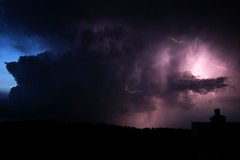This is my fourth effort for Friday Fictioneers. See the rest of the party here. Join us!
Clouds in Toronto
Calliope picked her long-legged way through the knee-deep fluff--one step down, then another, then an eddy back into the brightness. Hanging from a plume out over the insubstantial landscape, one finger pinched in her book, she wondered: What can be done here, if this is the best they have for summer? No shimmering cliffs blazed by the Aegean sun? No sea foam upon which Neptune could ride? Instead bleak towers sprung up from dark, dense woods lapped by an insipid lake.
Ah, but that could be a poet there, on that balcony, or could become one. Blindness could help here.
101 words
--------------------
(In The Lively Art of Writing, Lucile Vaughan Payne says that if you have to explain a literary allusion, you've lost it. So I won't explain. :-) )







